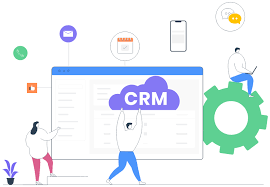CRM became the most popular software in the world in 2017 and shows no signs of slowing down now. The growing need for†CRM software development†for small businesses has generated fierce competition. Because of this, prices have dropped, and†CRM software development services are now accessible to the smallest of companies.†Unlike the old CRM systems, the CRM of today often comes with robust feature sets that include much more than simple capabilities to manage customer relationships. From marketing to customer support, the scope of features in a CRM for small businesses has expanded significantly. Here are the most important factors to take into consideration when choosing†CRM software for small businesses:
CRM Software For Small Business
The†CRM software for your business†should always depend on your needs. There is a vast array of options, and you should be sure you are buying the solution that best meets your unique needs. Before selecting a†CRM software development for small businesses, you should know if you want a CRM that delivers powerful and agile lead-generating software.†You should know if your deals are getting stuck in the pipeline. If so, youíll want†CRM with robust sales reporting, so you can identify where the bottleneck is.†Before selecting, there are just a few questions you should ask. Itís essential to map out the needs of your company. Then, choose the CRM that meets every one of those needs.
Price of The CRM Software
If your business is a startup or a growing business, itís essential to consider the price factor as the resources are limited. Unlike giant enterprise companies, you cannot spend a considerable amount to shell out all the software tools your business needs to grow. So, price becomes an issue. Try to choose a CRM thatís probably an all-in-one CRM, which includes additional features like marketing automation and customer support.
Ease of Use
Before selecting your CRM Software, you should know how easy it is to use the system you are considering. One of the most common mistakes you can make is purchasing a CRM with a steep learning curve that is difficult for employees to use. If the system is difficult to use, adopting it will be low among your team, and your CRM will make you less efficient. If some people from your team are working on it and others are not, you will lose alignment across teams, and data integrity will go out the window.
Customer Support
Once you have implemented it, you should know how your provider will support you when you have an issue. Your business should look into the type of customer support you will receive. If you face a problem, you canít solve it alone. Support must be available. Otherwise, you will struggle to use your software effectively and wonít generate the maximum ROI from your choice of CRM software development.
†Measure Metrics
Your company must make data-driven decisions. You need to maintain insight into results to know what is working and what needs improvement in your business. It can become challenging to do that if you donít have robust metrics in your CRM.
Your†CRM for small businesses†should provide metrics and analysis on things such as:
- The state of your sales funnel
- Your sales cycle
- Future sales and revenue
- Revenue growth over time
- Campaign outcomes
You will be able to find the right CRM Mobile app development†for you quickly. The key is knowing what you need and identifying the solution to those needs when you see them.


